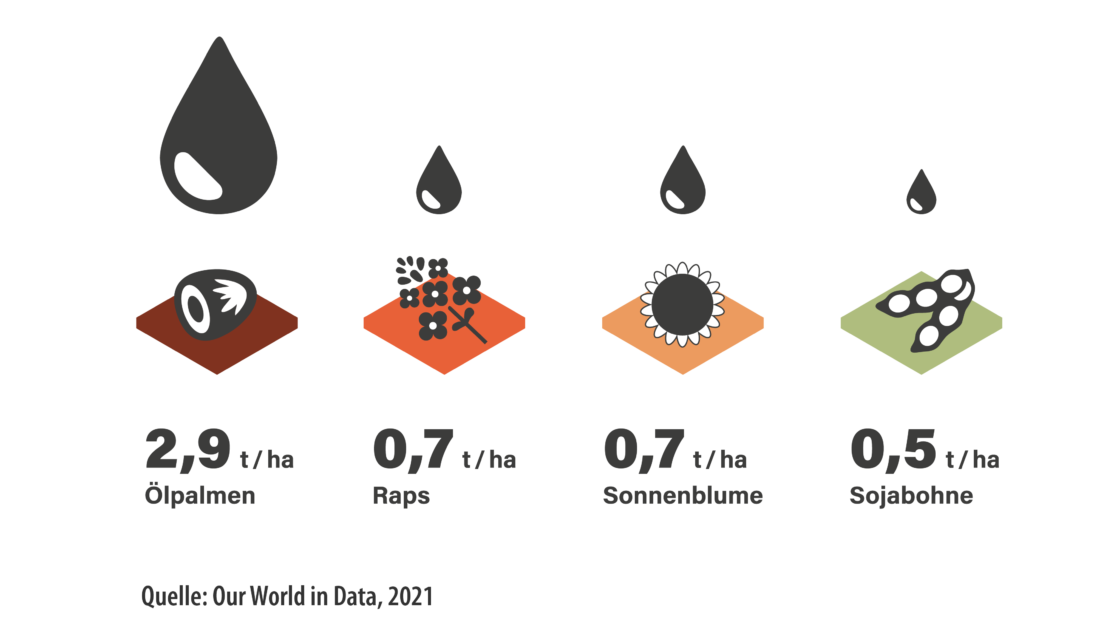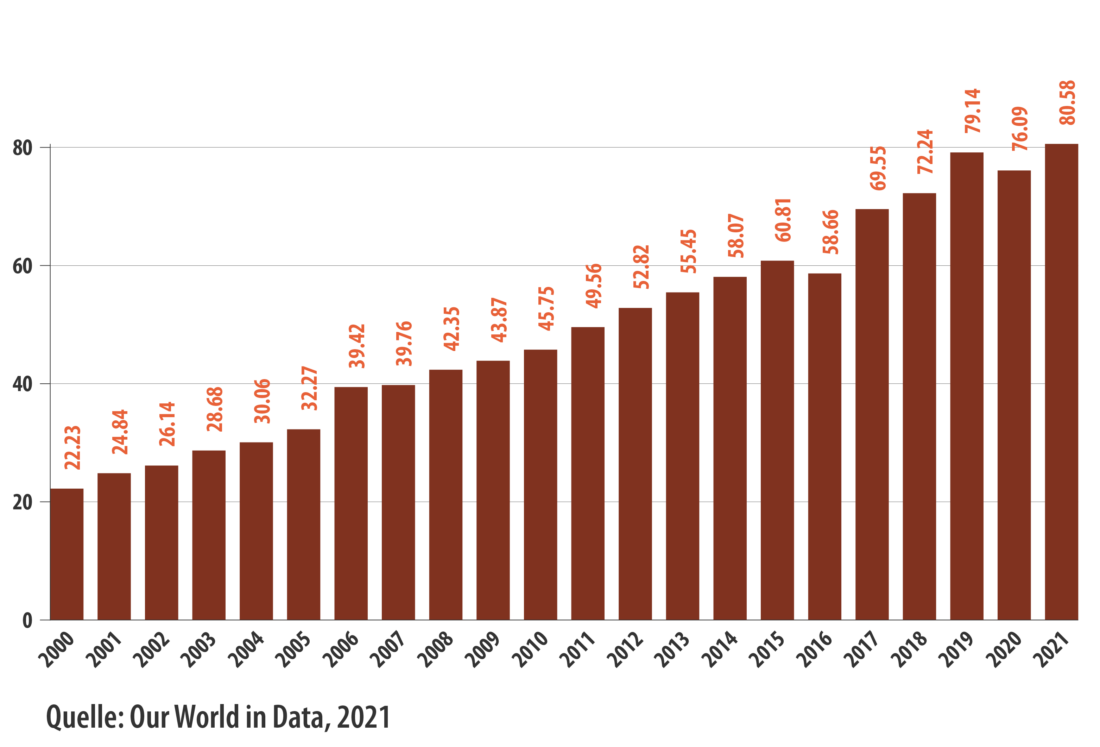
Palmöl
Palmöl hat viele Vorteile. Das Pflanzenöl sorgt in vielen Lebensmitteln für die richtige Struktur und Konsistenz. Der neutrale Geschmack, seine Hitzestabilität und seine breite Vielseitigkeit in der Lebensmittelherstellung machen dieses Öl für die Industrie sehr attraktiv. Zudem ist die Ölpalme sehr ergiebig. Sie braucht weniger Land als jede andere Ölpflanze, ist weniger krankheitsanfällig als andere Kulturpflanzen und kann bis zu dreissig Jahre lang konstante Erträge liefert. Das macht Palmöl günstiger als konkurrierende Öle.
Effizienz der Landnutzung bei der Pflanzenölproduktion 2021

Weltweiter Palmölboom
Die Palmölproduktion hat sich in den letzten 20 Jahren mehr als verdreifacht. Indonesien und Malaysia sind für 84% der weltweiten Produktion verantwortlich. Palmöl ist heute das meistverwendete pflanzliche Öl weltweit.

Weltweite Produktion von pflanzlichen Ölsaaten in Millionen Tonnen 2023

TV report: Palm oil harvesting and processing
Lebenswichtiges Einkommen
In vielen tropischen Ländern hat die Palmölproduktion die ländliche Entwicklung vorangetrieben. Weltweit ist Palmöl für mehr als 7 Millionen Menschen eine wichtige Einkommensquelle. Obwohl die Anbauflächen der kleinbäuerlichen Betriebe im Vergleich zu den industriellen Plantagen klein sind, macht die kleinbäuerliche Produktion allein in Malaysia und Indonesien etwa 40 % der gesamten Anbaufläche von Palmöl aus (RSPO).
«SECO works to promote the use of sustainability labels and standards in the production of agricultural raw materials. That is why it is also involved in the development of sustainable palm oil supply chains.»
Monica Rubiolo, Head Trade Promotion SECODas Problem
Im Zuge des weltweiten Palmölbooms werden nicht nur in Indonesien und Malaysia, sondern auch in anderen tropischen Ländern wie Papua-Neuguinea, Kolumbien, Nigeria und der Elfenbeinküste neue Plantagen angelegt. Neue Palmölplantagen verdrängen oft wertvolle tropische Regenwälder und berauben damit viele Arten ihres Lebensraums. Durch Brandrodung und die Trockenlegung von Torfsumpfwäldern werden große Mengen an Treibhausgasen wie Kohlendioxid und Methan freigesetzt. Neue Plantagen lösen oft auch Konflikte um die Landnutzung aus.
Nachhaltigkeit
Um die Zerstörung der artenreichen Tropenwälder zu begrenzen, gründeten Erzeuger, Finanzinstitute, Organisationen der Zivilgesellschaft, Industrie und Handel 2004 den Runden Tisch für nachhaltiges Palmöl (RSPO).
Weltweit wird leider immer noch ein Grossteil des gesamten Palmöls nicht nach anerkannten Nachhaltigkeitsstandards zertifiziert. Im Jahr 2023 waren erst etwas mehr als 16 Millionen Tonnen, d. h. 20 % der weltweiten Palmölproduktion nach einem Nachhaltigkeits-Standard zertifiziert, davon ca. 10,6 Millionen Tonnen nach dem RSPO.
Laut jüngstem Impact-Report hat der RSPO heute über 6.000 Mitgliedsorganisationen in mehr als 100 Ländern. Die zertifizierte Ölpalmen Fläche umfasst 5,2 Millionen Hektar in 23 Ländern. Im Rahmen der RSPO-Zertifizierung konnte eine Fläche 19 Mal so groß wie Kuala Lumpur, d. h. 466.609 Hektar, erhalten werden. RSPO-Kredite im Wert von 7,0 Millionen US-Dollar kamen direkt 85 zertifizierten unabhängigen Kleinbauerngruppen im Jahr 2023 zugute, während 9 RSPO-Programme zur Einbindung von über 200 Grassroot Organisationen in 7 Ländern durchgeführt wurden. Seit 2015 wurden kumulativ Treibhausgasemissionen in Höhe von 468.864 Autos vermieden – das entspricht der Kraftfahrzeugflotte von Kamerun.
RSPO shows impact
Alternativen
Die Palmölimporte der Schweiz sind zurückgegangen, weil die Hersteller teilweise auf alternative Öle aus Soja, Kokosnuss, Sonnenblumen oder Raps umsteigen. Eine Umstellung von Palmöl auf andere Öle löst das Problem jedoch nicht, da die Alternativen kaum besser sind: zusätzliche Kokosnussplantagen müssten z.B. auf den Philippinen und in Indonesien angelegt werden, oder auch weitere Sojaplantagen in Südamerika. Um einen Liter Öl aus Sonnenblumen oder Raps zu gewinnen, wird außerdem eine viel größere Fläche für den Anbau dieser Pflanzen benötigt.
„Wenn man sich die katastrophalen Auswirkungen von Palmöl ansieht (...), wird einem klar, dass es keine einfachen Lösungen gibt. Die Hälfte der Weltbevölkerung verwendet Palmöl in ihrer Nahrung. Wenn man es verbietet oder boykottiert, wird es einfach durch andere Öle ersetzt werden. Gleichzeitig braucht man aber viel mehr Anbauflächen für Palmöl.“
Inger Andersen, ehemalige Director General IUCN